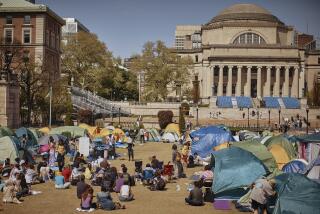JUDGE UPHOLDS SCHOOL’S FIRING
- Share via
BOULDER, COLO. — The University of Colorado professor who was fired after likening victims of the Sept. 11 terrorist attacks to a Nazi leader cannot return to the classroom, a state judge decided Tuesday.
Ethnic studies professor Ward L. Churchill had won a lawsuit in April alleging that the university had retaliated against him for exercising his free-speech rights -- not for the academic misconduct of which he was subsequently accused.
Yet the jury also awarded him only $1 in damages. Chief Denver Judge Larry Naves cited that in ruling that Churchill would not return to his $96,392-per-year job nor be entitled to a financial settlement: “I am bound by the jury’s implicit finding that Professor Churchill has suffered no actual damages as a result of the constitutional violation.”
Naves also agreed that Churchill’s return would weaken the school’s ability to hold students and faculty accountable for misconduct.
Churchill criticized the decision. “What he’s saying, in essence, is they were not prepared to treat me as any other faculty member would be treated, which was all I ever required.”
He said he would appeal. “I will continue to deal with it until the day I drop,” he said.
The university fired Churchill in 2007 -- two years after a firestorm over an essay he penned soon after the Sept. 11, 2001, terrorist attacks, which killed nearly 3,000 people.
The essay, “Some People Push Back: On the Justice of Roosting Chickens,” blamed the attacks on U.S. foreign policy and called World Trade Center victims “little Eichmanns” -- a reference to Nazi Adolf Eichmann.
The essay didn’t become widely known until 2005, when a newspaper at Hamilton College in upstate New York wrote about it before Churchill was scheduled to speak there. Fury ensued, and then-Colorado Gov. Bill Owens, among others, called for Churchill’s ouster.
University officials concluded that free-speech protections precluded firing him for the essay. But complaints about his academic work also surfaced. After three committees concluded that he had committed plagiarism, fabrication and research misconduct in writings on American Indian history, he was fired.
Churchill said Tuesday that he had never sought money -- only to return to the campus where he had worked for 30 years. Millions couldn’t compensate him for the damage the university had wrought, he said.
His attorney, David Lane, said jurors awarded Churchill the sum of $1 because they expected him to get his job back.
“America has to be scratching its head, saying, ‘Do we actually have a 1st Amendment in this country?’ ” he said.
But University of Colorado Chancellor Phil DiStefano hailed the ruling as a “victory for faculty governance.”
“I don’t think this was ever about free speech,” DiStefano said. “This whole case was about academic integrity.”
None of the faculty members with whom he has spoken supported Churchill’s return, DiStefano said. But at a hearing last week, the chairwoman of the ethnic studies department, Emma Perez, testified that she was eager for Churchill to come back. She could not be reached for comment Tuesday.
Churchill said he did not regret the essay, maintaining: “What I said needed to be said.”
Some people have told him there are consequences to free speech. They don’t understand the concept, he said: “If there are consequences, it’s not free.”
--
Correll writes for The Times.
More to Read
Sign up for Essential California
The most important California stories and recommendations in your inbox every morning.
You may occasionally receive promotional content from the Los Angeles Times.










